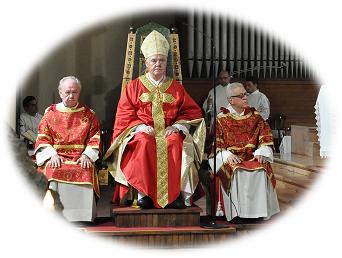Private Judgment
Private Judgment
Prove all things! hold fast that which is good.
1 Thessalonians 5:21
There were three great doctrines or principles which won the battle of the Protestant Reformation. These three were: (1) the sufficiency and supremacy of Holy Scripture, (2) the right of private judgment, and (3) justification by faith only, without the deeds of the law.
 These three principles were the keys of the whole controversy between the Reformers and the Church of Rome. If we keep firm hold of them when we argue with a Roman Catholic, our position is unassailable: no weapon that the Church of Rome can forge against us will prosper. If we give up any one of them, our cause is lost.
These three principles were the keys of the whole controversy between the Reformers and the Church of Rome. If we keep firm hold of them when we argue with a Roman Catholic, our position is unassailable: no weapon that the Church of Rome can forge against us will prosper. If we give up any one of them, our cause is lost.
Let us carefully remember this. The Roman controversy is upon us once more. We must put on the old armour, if we would not have our faith overthrown. The sufficiency of Holy Scripture, – the right of private judgment – justification by faith only – these are the three great principles to which we must always cling. Let us grasp them firmly, and never let them go.
One of the three great principles to which I have referred appears to me to stand forth in the verse of Scripture which the Holy Ghost, by the mouth of St. Paul, says to us, "Prove all things; hold fast that which is good." In these words we have two great truths.
- The right, duty, and necessity of private judgment: "Prove all things."
- The duty and necessity of keeping firm hold upon truth: "Hold fast that which is good."
When I say the right of private judgment, I mean that every individual Christian has a right to judge for himself by the Word of God, whether that which is put before him as religious truth is God's truth, or is not.
When I say the duty of private judgment, I mean that God requires every Christian man to use the right of which I have just spoken – to compare man's words and man's writings with God's revelation, and to make sure that he is not deluded and taken in by false teaching.
And when I say the necessity of private judgment, I mean that it is absolutely needful for every Christian who would not be deceived, to exercise the right, and discharge the duty to which I have referred; seeing that experience shows that the neglect of private judgment has always been the cause of immense evils in the Church of Christ.
Now the Apostle Paul urges all these three points upon our notice when he uses those remarkable words, "Prove all things." I ask particular attention to that expression.
He does not say, "Whatsoever apostles – whatsoever evangelists, pastors, and teachers – whatsoever your bishops – whatsoever your ministers tell you is truth, that you are to believe." No! he says, "PROVE ALL THINGS." He does not say, "Whatsoever the universal Church pronounces true, that you are to hold." No! he says, "Prove all things."
 The principle laid down is this: "Prove all things by the Word of God – Measure all by the measure of the Bible – Compare all with the standard of the Bible – Test all in the crucible of the Bible. That which can abide the fire of the Bible, receive, hold, believe, and obey. That which cannot abide the fire of the Bible, reject, refuse, repudiate, and cast away."
The principle laid down is this: "Prove all things by the Word of God – Measure all by the measure of the Bible – Compare all with the standard of the Bible – Test all in the crucible of the Bible. That which can abide the fire of the Bible, receive, hold, believe, and obey. That which cannot abide the fire of the Bible, reject, refuse, repudiate, and cast away."
This is private judgment. This is the right we are bound to exercise. We are not to believe things in religion merely because they are said by Popes or Cardinals – by Bishops or Priests – by Presbyters or Deacons – by Churches, Councils, or Synods – by Fathers, Puritans, or even Reformers. We are not to argue, "such and such things must be true, because these men say so." We are to prove all things by the Word of God.
Some men I know, refuse to believe this doctrine of private judgment; but I assert confidently that it is continually taught in the Word of God, and this, again, is the principle laid down by our Lord Jesus Christ in the Sermon on the Mount. The Head of the Church says there – "Beware of false prophets which come to you in sheep's clothing, but inwardly they are ravening wolves. Ye shall know them by their fruit" (Matt. 7:15). How is it possible that men shall know these false prophets, except they exercise their private judgment as to what their fruits are?
This is the practice we find commended in the Bereans, in the Acts of the Apostles. They did not take the apostle Paul's word for granted, when he came to preach to them. We are told, that they "searched the Scriptures daily, whether those things were so," and "therefore," it is said, "many of them believed" (Acts 17:11, 12). What was this again but private judgment?
This also is the spirit of the advice given in 1 Cor. 10:15 – "I speak as unto wise men: judge ye what I say": and in John 4:1 – "Beloved, believe not every spirit, but try the spirits, whether they are of God," and in 2 John 10 – "If there come any unto you, and bring not this doctrine, receive him not into your house." These passages to my mind seem to say to every individual Christian, "Prove all things."
Suppose that, in fear of private judgment, we resolve to believe whatever the Church believes. Where is our security against error? The Church is not infallible. There was a time when almost the whole of Christendom embraced the Arian heresy, and did not acknowledge the Lord Jesus Christ to be equal with the Father in all things. There was a time, before the Reformation, when the darkness over the face of Europe was a darkness that might be felt – The General Councils of the Church are not infallible. Our Twenty-first Article says, "They may err, and sometimes have erred, even in things pertaining unto God. Wherefore things ordained by them as necessary to salvation, have neither strength nor authority, unless it may be declared that they be taken out of Holy Scripture."
Suppose that we resolve to believe whatever our minister believes. Once more I ask – Where is our security against error? Ministers are not infallible, any more than Churches. All of them have not the Spirit of God. The very best of them are only men. Call them Bishops, Priests, Deacons, or whatever names you please, they are all earthen vessels. "Beware of looking upon them as infallible – beware of thinking of any man (whoever that man may be) that he cannot err." Let us never make ministers Popes. Let us follow them so far as they follow Christ, but not a hair's breadth further.
I have said that it is impossible to overrate the evils that may arise from neglecting to exercise private judgment. I will go further, and say that it is impossible to overrate the blessings which private judgment has conferred both on the world and on the Church.
 I ask my readers, then, to remember that the greatest discoveries in science and in philosophy, beyond all controversy, have arisen from the use of private judgment. To this we owe the discovery of Galileo, that the earth went round the sun, and not the sun round the earth – To this we owe Columbus's discovery of the continent of America. – To this we owe Harvey's discovery of the circulation of the blood – To this we owe Jenner's discovery of vaccination – To this we owe the printing press, the steam engine, the power-loom, the electric telegraph, railways, and gas. For all these discoveries we are indebted to men who "dared to think for themselves." They were not content with the beaten path of those who had gone before. They made experiments for themselves. They brought old-established theories to the proof, and found that they were worthless. They proclaimed new systems, and invited men to examine them, and test their truth. They bore storms of obloquy and ridicule unmoved. And they prospered and succeeded in what they did. And we who live in the present century are reaping the fruit of their use of private judgment.
I ask my readers, then, to remember that the greatest discoveries in science and in philosophy, beyond all controversy, have arisen from the use of private judgment. To this we owe the discovery of Galileo, that the earth went round the sun, and not the sun round the earth – To this we owe Columbus's discovery of the continent of America. – To this we owe Harvey's discovery of the circulation of the blood – To this we owe Jenner's discovery of vaccination – To this we owe the printing press, the steam engine, the power-loom, the electric telegraph, railways, and gas. For all these discoveries we are indebted to men who "dared to think for themselves." They were not content with the beaten path of those who had gone before. They made experiments for themselves. They brought old-established theories to the proof, and found that they were worthless. They proclaimed new systems, and invited men to examine them, and test their truth. They bore storms of obloquy and ridicule unmoved. And they prospered and succeeded in what they did. And we who live in the present century are reaping the fruit of their use of private judgment.
And as it has been in science, so also it has been in the history of the Christian religion. The martyrs who stood alone in their day, and shed that blood which has been the seed of Christ's Gospel through our the world – the Reformers, who, one after another, rose up in their might to enter the lists with the Church of Rome, – all did what they did, suffered what they suffered, proclaimed what they proclaimed, simply because they exercised their private judgment about what was Christ's truth – Private judgment made the Vallenses, the Albigenses, and the Lollards, count not their lives dear to them, rather than believe the doctrines of the Church of Rome – Private judgment made Wycliffe search the Bible in our own land, denounce the Romish friars, and all their impostures, translate the Scriptures into the vulgar tongue, and become "the morning star" of the Reformation – Private judgment made Luther examine Tetzel's evil system of indulgences by the light of the Word – Private judgment led him on, step by step, from one thing to another, guided by the same light, till at length the gulf between him and Rome was a gulf that could not be passed, and the Pope's power in Germany was broken – Private judgment made our English Reformers examine for themselves, and inquire for themselves, as to the true nature of that corrupt system under which they had been born and brought up – Private judgment made them cast off the evils of Popery, and circulate the Bible among the laity – Private judgment made them draw from the Bible our Articles, compile our Prayer-book, and constitute the Church of England as it is. They broke the fetters of tradition, and dared to think for themselves. They refused to take for granted Rome's pretensions and assertions. They examined them all by the Bible, and because they would not abide the examination, they broke with Rome altogether. All the blessings of Protestantism, all that we are enjoying at this very day, we owe to the right exercise of private judgment. Surely if we do not honour private judgment, we are thankless and ungrateful indeed!
Let us not be moved by the common argument, that the right of private judgment is liable to be abused.
Private judgment has been abused! What good gift of God has not been abused? What high principle can be named that has not been employed for the very worst of purposes? Because opium is used improperly by some, is it not to be used as a medicine on any occasion at all? Because money may be used improperly, is all money to be cast into the sea? You cannot have good in this world without evil. You cannot have private judgment without some abusing it, and turning it to bad account.
 But private judgment, people say, has done more harm than good! What harm has private judgment done, in matter of religion, to be compared to the harm that has been done by the neglect of it? Some are fond of telling us that among Protestants who allow private judgment, there are divisions, and that in the Church of Rome, where private judgment is forbidden, there are no divisions. I might easily show such objectors that Romish unity is far more seeming than real.
But private judgment, people say, has done more harm than good! What harm has private judgment done, in matter of religion, to be compared to the harm that has been done by the neglect of it? Some are fond of telling us that among Protestants who allow private judgment, there are divisions, and that in the Church of Rome, where private judgment is forbidden, there are no divisions. I might easily show such objectors that Romish unity is far more seeming than real.
But grant for a moment that private judgment has led to divisions, and brought about varieties. I say that these divisions and varieties are but a drop of water when compared with the torrents of evils that have arisen from the Church of Rome's practice of disallowing private judgment altogether. Give me Protestant divisions, certainly, rather than Popish unity, with the fruit that it brings forth. Give me Protestant variations, rather than Romish ignorance, superstition, darkness, and idolatry. Give me the Protestant diversities of England and Scotland, with all their disadvantages, rather than the dead level, both intellectual and spiritual of the Italian peninsula.
In any case let us not be moved by the specious argument, that it is humility to disallow private judgment, and to have no opinion of our own, that it is the part of a true Christian not to think for himself!
Such humility is a false humility, a humility that does not deserve that blessed name. Call it rather laziness, idleness, and sloth. It gives a man a mere vicarious religion, a religion by which he places his conscience and all his spiritual concerns under the care of others. He needs no longer think for himself! Let us beware of supposing that this deserves the name of humility. It is refusing to exercise the gift that God has given us. Blessed be God, our forefathers did not act upon such principles! Had they done so, we should never have had the Reformation. From such humility may God ever deliver us!
As long as we live, let us resolve that we will read for ourselves, think for ourselves, judge of the Bible for ourselves, in the great matters of our souls. Let us dare to have an opinion of our own. Let us never be ashamed of saying, "I think that this is right, because I find it in the Bible" and "I think that this is wrong, because I do not find it in the Bible." "Let us prove all things," and prove them by the Word of God.
Let us think of the solemn account which every one of us, individually, will have to give in that day before the judgment seat of Christ. We shall be judged individually, each by himself.
And now let me speak of the duty and necessity of keeping firm hold upon God's truth.
The words of the Apostle on this subject are pithy and forcible. "Hold fast," he says, "that which is good." It is as if he said to us, "When you have found the truth for yourself, and when you are satisfied that it is Christ's truth, keep it in your heart, never let it go."
St. Paul speaks as one who knew what the hearts of all Christians are. He knew that our grasp of the Gospel, at our best, is very cold – that our love soon waxes feeble – that our faith soon wavers.
He speaks as one who foresaw that Satan and all his agents would labour hard to cast down Christ's truth, and he cries, "Hold fast that which is good."
The advice is always needed – The best visible church of Christ is not free from a liability to degenerate. It is made up of fallible men. There is always in it a tendency to leave its first love. We see the leaven of evil creeping into many a church, even in the apostle's time.
Many churches of Christ since then have fallen away for the want of remembering this principle. Their ministers and members forgot that Satan is always labouring to bring in false doctrine, and that no church is ever safe that does not bear in mind the apostle's injunction: "Hold fast that which is good."
If ever there was a time in the world when churches were put upon their trial, whether they would hold fast the truth or not, that time is the present time. Popery, that old enemy of our nation, is coming in upon us in this day like a flood. We are assaulted by open enemies without, and betrayed continually by false friends within. The number of Roman Catholic churches, and chapels, and schools, and conventual and monastic establishments, is continually increasing around us. Month after month brings tidings of some new defection from the ranks of the Church of England to the ranks of the Church of Rome. Surely now or never, we ought all of us to awake, and "Hold fast that which is good."
Rome never changes. It is her boast that she is always the same.
And the question is now, whether we are going to abide quietly, sit still, and fold our hands, and do nothing to resist the assault. It is a time which will soon prove whether we know the value of our privileges. It is a time which will soon prove whether we intend to allow our candlestick to be removed, or to repent, and do our first works, lest any man should take our crown. If we love the open Bible – if we love the preaching of the Gospel – if we love the privilege of reading that Bible, and the opportunity of hearing that Gospel, if we love religious liberty – we must make up our minds to "hold fast," lest by and by we lose all.
Contending for the Truth – A Duty⤒🔗
We must all work. Every living soul has a sphere of influence. Every living soul can throw some weight into the scale of the Gospel. Let him see to it that he casts it in.
If we would "hold fast" that which is good, we must never countenance any doctrine which is not the pure doctrine of Christ's Gospel. There is a hatred which is downright charity, that is, the hatred of erroneous doctrine. There is an intolerance which is downright praiseworthy – that is, the intolerance of false teaching in the pulpit. Who would ever think of tolerating a little poison given to him day by day? If men come among us who do not preach "all the counsel of God," who do not preach of Christ, and sin, and holiness, of ruin, and redemption, and regeneration, we ought to cease to hear them.
If we would hold fast the truth, we must be ready to unite with all who hold the truth, and love the Lord Jesus Christ in sincerity. We must be ready to lay aside all minor questions as things of subordinate importance. Establishment or no Establishment, Liturgy or no Liturgy, Bishops or Presbyters – all these points of difference, however important they may be in their place – all ought to be regarded as subordinate questions. I ask no man to give up his private opinions about them.
Some may say, "This is very troublesome." Some may say, "Why not sit still and be quiet? What need is there for all this trouble?" What good thing was ever got, or ever kept, without trouble? And Christ's truth is seldom made a nation's property, and kept a nation's property, without pains, without struggles, and without trouble.
Let the man who talks of "trouble" tell us where we should be at this day, if our forefathers had not taken some trouble? Where would be the Gospel, if martyrs had not given their bodies to be burned? They counted not their lives dear for the Gospel's sake. They laboured and travailed, and we have entered into their labours. One thing is very sure, that nothing but Christ's Gospel will ever do us good. Nothing else will ever bring down God's blessing upon our land.
Prove all Things←⤒🔗
I have set forth in plain language two things. One is the right, the duty, and necessity of private judgment. The other is the duty and necessity of keeping firm hold upon truth – It only remains to apply these things to the individual consciences of my readers.
For another thing, if it be right to "prove all things," let us take special care to try every Roman Catholic doctrine, by whomsoever put forward, by the written Word of God. Let us believe nothing, however speciously advanced, except it can be proved to us out of the Scripture. The Bible alone is infallible. That alone is light. That alone is God's measure of truth and falsehood. "Let God be true, and every man a liar."
Last of all, if it be right to "hold fast that which is good," let us make sure that we have each laid hold personally upon Christ's truth for ourselves. Let us see to it that we each flee for refuge, and lay hold upon the hope set before us in His glorious Gospel. Let us do this, and then all things are ours. The Church may fail. The State may go to ruin.
- For one thing, if it be our duty to "prove all things," let me beseech and exhort all churchmen to arm themselves with a thorough knowledge of the written Word of God. Let us read our Bibles regularly and become familiar with their contents. Let us prove all religious teaching, when it is brought before us, by the Bible. A little knowledge of the Bible will not suffice. A man must know his Bible well, if he is to prove religion by it; and he must read it regularly, if he would know it well. There is no royal road to a knowledge of the Bible. There must be patient, daily, systematic reading of the Book, or the Book will not be known.
The foundations of all establishments may be shaken. The enemies of truth may for a season prevail. But we shall have in this world peace, and in the world which is to come, life everlasting; for we shall have Christ, and having Him, we have all.

Add new comment